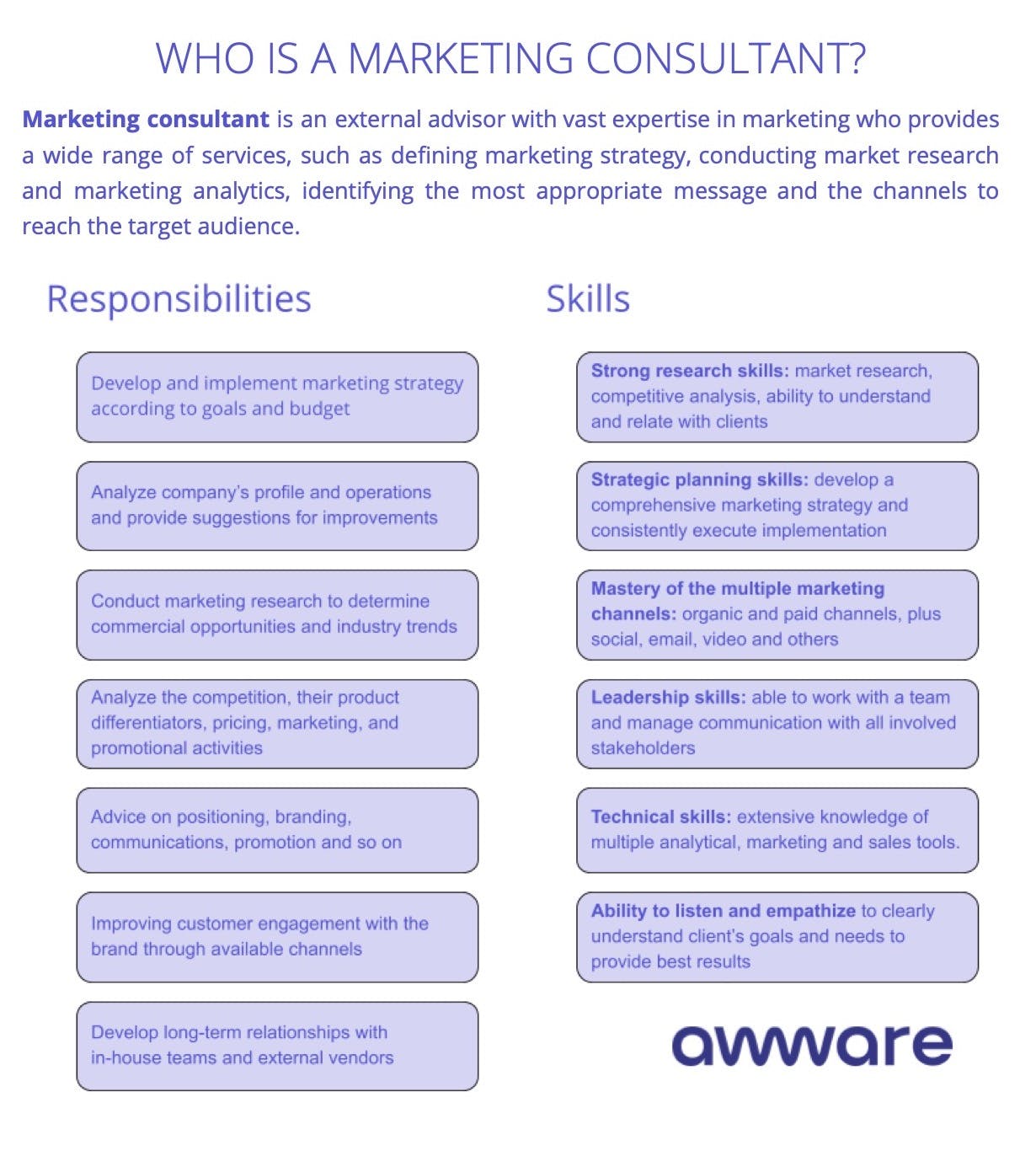
Starting your own IT consulting company involves many steps. Step one is to choose a niche. Next, you will need to choose a business structure. After you have established the structure, you'll need to set up a website. The next step is to begin offering your services.
Step 1
The first step in setting up your own IT consulting business is to understand what you want to do. It's now time to determine your strengths, weaknesses, and areas in which you can best provide services. Once you have identified your expertise you can create a mission and set up your foundation.

Selecting a business structure
There are many things you should consider when deciding on the structure of your IT consulting company. An LLC is a popular business structure for IT consulting companies. It allows flexibility and protects against liability. An LLC has limitations. It must have a bank account established and tax paid on any income earned. You can also consider a sole proprietorship. A S Corporation is a great option for expanding your business to more clients. This type of business structure protects you assets, but places more responsibility on shareholders.
Starting a website
It is important to think about several things when starting a website. These factors include who your target customers are, how they will reach you, and how you plan to market your company. Luckily, you can find resources to help you get started.
Selecting a business partnership
When choosing a business partner, you must consider their personality and your business objectives. You may choose a partner who shares your values, has the same goals and is a good fit for you. However, it may not be the right partner if they have different skills or personalities. You might feel more at ease working with a friend, colleague or coworker. Partner should be trustworthy and honest.
Choose a business name
First, you need to decide on a business name. It is important to ensure that your business name does not sound similar or confusing to other firms in your industry. You need to put in enough effort and time to brainstorm different ideas. After you have created a business name that is unique, it's important to protect it with a domain name. This will ensure that no one else can register the name. If you have any questions about the choice of name, a naming expert can help.

Build a team
Building a team is important when starting a consulting business. A team must be cohesive and responsive to client needs. Each consulting company is unique and faces different challenges. For example, you may need a marketing manager who can strategize and make connections for you or a billing specialist who can take care of accounts and collect payments. These positions will allow you to build a team that can meet the needs and expectations of your client.
FAQ
Do I need a degree to be a consultant?
You can become an expert in any subject by learning the subject thoroughly, then applying what you have learned.
Start studying today if you want the skills to be a great manager!
Employers may be reluctant to hire people with a degree, but not the relevant experience. But, if your qualifications are comparable to those who have been hired, you might still be eligible to apply.
But remember, employers will always look for candidates with real-world expertise.
What is the difference between consulting and freelancing?
Freelancers work as independent contractors and offer their services without the assistance of an agency or company. They generally charge an hourly rate depending on how long they spend on a client project. Consultants usually work for agencies or companies that employ them. Their salaries are often paid monthly, or annually.
Consultants often have more flexibility, while freelancers can choose to work when they want and set their own rates. Consultants often offer better benefits such as vacation days and retirement plans, health insurance, and vacation days.
Do I need to seek legal advice?
Yes! Yes. Many consultants sign contracts without seeking legal advice. This can lead to issues down the road. If the client terminates an agreement with the consultant before the completion date, what are the consequences? What happens if the consultant doesn’t meet the deadlines specified in the contract.
It's best to consult with a lawyer to avoid potential problems.
Which industries use consultants?
There are many types and styles of consultants. There are many types of consultants. Some specialize in one type of business, while others can handle multiple areas.
Some consultants work only for private companies, while others represent large corporations.
Some consultants can also help businesses all around the globe.
What kind of contracts can consultants sign?
Most consultants sign standard employment deals when they're hired. These agreements include details such as how long the consultant will stay with the client, what he/she can be paid, and other important information.
Contracts also specify which areas of expertise the consultant will focus on and how the consultant will be compensated. An agreement could state, for example, that the consultant will offer training sessions, workshops and webinars.
Sometimes the consultant will simply agree to complete a task within a certain timeframe.
Many consultants sign independent contractor arrangements in addition to standard employment contracts. These agreements allow the consultant not only to work for himself/herself but also provide payment.
How do I choose a good consultant?
There are three main things to keep in mind:
-
Experience - How skilled is the consultant? Is she an expert, beginner, intermediate or advanced consultant? Does her resume demonstrate that she has the required skills and knowledge
-
Education - What did he/she learn in school? Did he/she pursue any relevant courses once he/she graduated? Can we see evidence of that learning in the way s/he writes?
-
Personality – Do we like this person/person? Would we like him/her to work with us?
-
The answers to these questions help determine if the consultant is right for our needs. If the answers are not clear, it may be worthwhile to interview the candidate in person to get more information about them.
How do I get clients to my consulting business?
Find an area that you are passionate about. You could choose anything from public relations to social media, but it should be something you love. If you don't feel passionate about it, you might need to start small with web design. Once you've found this niche, make sure you understand what makes it tick. What problems does this solve? What are the benefits? And most importantly, how can you help them?
You can also approach businesses directly.
If all else fails offer your services for free at networking events and conferences. You'll get to know many potential clients without spending money advertising.
Statistics
- According to statistics from the ONS, the UK has around 300,000 consultants, of which around 63,000 professionals work as management consultants. (consultancy.uk)
- 67% of consultants start their consulting businesses after quitting their jobs, while 33% start while they're still at their jobs. (consultingsuccess.com)
- So, if you help your clients increase their sales by 33%, then use a word like “revolution” instead of “increase.” (consultingsuccess.com)
- "From there, I told them my rates were going up 25%, this is the new hourly rate, and every single one of them said 'done, fine.' (nerdwallet.com)
- WHY choose me: Why your ideal client should choose you (ex: 10 years of experience and 6-week program has helped over 20 clients boost their sales by an average of 33% in 6 months). (consultingsuccess.com)
External Links
How To
What does a typical day look like for a consultant?
A typical day will vary depending on the type of work you are undertaking. However, the majority of your day will consist of research and planning, meeting clients and preparing reports.
Clients will often meet with you to discuss their problems. These meetings can be held over the telephone, online or face-to face.
Also, proposals are documents that outline your ideas or plans for clients. You'll need to discuss your proposals with a mentor, colleague, or friend before you present them.
After all the preparation and planning, it's time to actually create some content. You might be creating articles, videos, editing photos, writing interviews, or designing websites.
You may need to conduct research depending on the scope of your project to find relevant statistics and figures. For example, you may need to find out how many customers you have and whether they are buying more than one product or service.
Once you have all the information needed, it is time for clients to see your findings. You may give your findings orally or in written form.
After your initial consultation with clients, you need to keep in touch. You can call clients to ask how they are doing or send emails asking for confirmation that your proposal was received.
This process takes time, but it's important to ensure that you stay focused and maintain good relationships with clients.